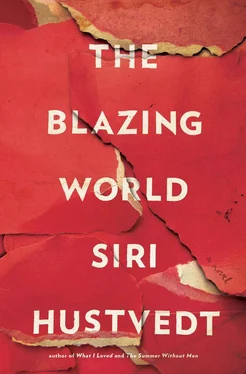Recognition. Dr. F. Isn’t that what we talk about? My greed for recognition. One to one. Tête-à-tête. You and I. I want you to see me.
Bruno listens to me, but he doesn’t always know what I am talking about. Nobody seems to know what I am talking about.
A year ago, I saw part of his film diary — the man, Rune (once Rune Larsen), at daily tasks, brushing his teeth, flossing his teeth, lying on the sofa, reading, sitting in front of the computer, and then stroking a redheaded woman’s hair over and over as she lay with her head on his shoulder in a big rumpled bed. And I thought to myself, this is what we never see because we are inside, not outside, and most of us cannot recall habitual events except as a blur of routine. Is this why he wants the film? The date appears on the screen, and there is a film for each day. The film does not run all day. It is not Warhol’s sleeper or the Empire State Building, but he documents one event, often minor, every day.
Do I remember if I took my vitamin this morning or brushed my teeth? Was it this morning or yesterday morning or the day before?
The hair-stroking might remain inside Rune and the young woman as a memory, but most likely from the internal perspective of each of them, each “I”—but sometimes we remember as observers. It is a kind of false memory. I remember the afternoon I stroked your curls over and over when we were first in love. I remember lying with you in bed and feeling your fingers in my hair as you petted me for minutes on end and how lovely it felt, and I remember the daylight in the room, and I remember our love. What is the memory of love? Do we actually recall the feeling? No. We know it was there, but the manic desire isn’t there in the memory. What do we recollect exactly? The sensations are not reproduced. And yet, an emotional tone or color is evoked, something weightless or heavy, pleasant or unpleasant, and I can summon it. I remember lying in bed with Felix. But is it one time or is it many times merged together from the early days of our clutching love, when I ached for his touch? I know I held his head sometimes when we fucked. I know I put my lips to his ear afterward and whispered words long forgotten, probably stupid words. But do I really remember a single time, the once only? Yes, in the Regina in Paris, with the uncomfortable beds we had to push together. Five stars and those beds. I think I remember the line of light between the heavy curtains as I sat on top of him, banging him. Long ago.
I remember coldness, too, his back to me. The distance between us, his eyes dead to me. I remember this: at a dinner. Where was it? The caustic joke about marriage, not ours, of course, but the institution in general. What were his words? I can’t remember. I recall I started, looked at him. In my mind I see a plate with a gold rim. He turned his head. Now it returns with the memory, pain, perhaps not as acute, but pain arrives with a recollection so vague it has almost disappeared — there was a joke, a plate, a look, and a cutting pain. Is pain more durable than joy in memory?
What moron said the past was dead? The past is not dead. Its phantoms own us. They own me. They have a stranglehold on me, but I don’t know if the revenants can be dispelled. Maybe I will consult with Radish. Maybe she will have some good advice for me. I will just have to keep working — the studio is burgeoning with the unseen works, the myriad monstrosities by someone named Harriet Burden. Maybe when the revelation comes the proverbial scales will fall from their eyes. Maybe when I’m dead some wandering art critic will come to the building where the goods are stored and look, really look, because the person (me) will finally be missing. Yes, nodding wisely, my imaginary critic will stare for a long time and then utter, here is something, something good. Rescued from oblivion like Judith Leyster.X Then again, what if it’s all crap anyway, despite my precious pseudonyms — the ones they desire, rather than me, not me. I am going to be sixty. Maisie has said she will throw a birthday party, and I have said, yes, but only for the dear hearts — no outlying friends of friends. Phinny wants to shop for a dress for me to wear when I turn the corner of another decade, something “ravishing,” he says.
Felix in dreams. Another Felix — hateful. He was never hateful in life — cool, closed, but not hateful. Why does he come?
But tonight, as I sit here at my desk and look out at the water — at winter, at the night, at the shining city — I feel a grief that has no object I can name, not Felix or my father or my mother. Just now, it came hard upon me, the grievous ache, but for what? Is it simply that there is so much less in front of me than behind me? Is it for the child called Harriet who walked with her head down? Is it for the old woman I am becoming? Is it because the fury of ambition has not been beaten out of me, not yet? Is it for the ghosts that have left their tracks inside me?
Yes, Harry, it’s the ghosts. But are names ghosts, too, insubstantial? Did you want to see your name in lights, up on the marquee? Vanity of vanities. The letters assigned to you at birth, designation of your paternity. Paternal lights? Is that what you hoped for? But why, Harry? Your father did not want the Burden born, his squalling burdensome little Burden, but there you were.
He came around.
Did he, Harry? Did he, really? Not to your satisfaction, I would say. Didn’t he prefer Felix? Didn’t even your mother favor Felix? Didn’t she say to you, You mustn’t be too hard on Felix? Didn’t she fuss over him, protect him?
Yes, but she loved me.
Yes, she did. But your work?
She didn’t understand my work.
It’s coming up, Harry, the blind and boiling, the insane rage that has been building and building since you walked with your head down and didn’t even know it. You are not sorry any longer, old girl, or ashamed for knocking at the door. It is not shameful to knock, Harry. You are rising up against the patriarchs and their minions, and you, Harry, you are the image of their fear. Medea, mad with vengeance. That little monster has climbed out of the box, hasn’t it? It isn’t nearly grown yet, not nearly grown. After Phinny, there will be one more. There will be three, just as in the fairy tales. Three masks of different hues and countenances, so that the story will have its perfect form. Three masks, three wishes, always three. And the story will have bloody teeth.
I. A standard definition of confabulation in neurology. Some brain-damaged patients fill gaps in their memories with stories and explanations that are manufactured unconsciously. Burden extends confabulation beyond pathology to the metamorphosing character of memory in general. In Notebook U, Burden writes at length on the myth that memory is fixed. She quotes William James in Chapter 11 of his Psychology (1896), “A permanently existing ‘idea’ which makes its appearance before the footlights of consciousness at periodic intervals is as mythological an entity as the Jack of Spades.” She cites Henri Bergson on memory, calling him “the enemy of every static division, threshold, and category,” as well as multiple neuroscience papers. “The demonstration of the vulnerability of memory when it is in an active state reinforces the idea that memories, reorganized as a function of new experiences, undergo a reconsolidation process.” S. J. Sara, “Retrieval and Reconsolidation: Toward a Neurobiology of Remembering,” Neurobiology of Learning and Memory Journal 7 (2000), 81.
II. Maurice Merleau-Ponty, Phenomenology of Perception , trans. Colin Smith (London: Routledge & Kegan Paul, 1962), 39.
III. Gottlob Frege (1848–1925), German mathematician, logician, and philosopher, who decisively marked modern mathematical logic and early analytical philosophy, in particular Bertrand Russell and Wittgenstein (the Tractatus ). “The logic is out there” probably refers to Frege’s contention that logic is an objective reality, not created by the human mind. According to Frege, logic deals with a world of ideal, not physical objects, but these ideal objects have as much objectivity as physical things. In Notebook H, Burden charts her reading of Husserl, who was influenced by Frege. Burden writes: “The mind is inescapable. How can logic be floating in some ideal reality beyond the human body and beyond human intersubjectivity? And yet, ideas move among us, not as physical objects but as utterances and symbols.”
Читать дальше












